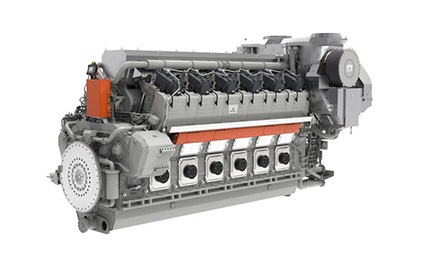Engines for Africa: Your Ultimate Vehicle Parts Store for High Quality Vehicle Parts
Engines for Africa: Your Ultimate Vehicle Parts Store for High Quality Vehicle Parts
Blog Article
The Influence of Innovative Engine Technologies on Power Effectiveness and Environmental Sustainability
In the world of transport and commercial equipment, the constant quest for improved energy efficiency and reduced environmental effect has led to substantial improvements in engine technologies. From the steady shift towards electric and hybrid systems to the integration of turbocharging for enhanced efficiency, the landscape of engines is evolving quickly. The utilization of alternative fuels even more expands the choices offered for lasting power resources. These developments not only promise a greener future yet also hold the potential to reinvent the means we approach power intake and environmental sustainability.
Evolution of Engine Technologies
The development of engine technologies over the years has actually been noted by continuous technology and improvement in pursuit of boosted efficiency and effectiveness. From the very early days of internal burning engines to the innovative hybrid and electric powertrains of today, the development of engine modern technologies has been driven by a ruthless quest for boosted gas performance and minimized exhausts.
One significant turning point in this evolution was the growth of turbocharging and direct shot systems, which considerably increased engine power output while boosting fuel effectiveness. These modern technologies enabled smaller, extra light-weight engines that might deliver the efficiency of larger ones without endangering on efficiency.
Additionally, advancements in products science have actually led to the extensive adoption of lightweight products such as light weight aluminum and carbon fiber in engine building and construction. This has not just lowered general lorry weight however has actually additionally boosted engine efficiency by minimizing energy losses related to inertia and friction.
Benefits of Electric and Crossbreed Systems
With the growing concentrate on sustainability and energy effectiveness, what advantages do hybrid and electrical systems provide in the world of engine modern technologies? Electric and hybrid systems present many advantages that add to a more energy-efficient and sustainable future. One of the key advantages is the significant decrease in greenhouse gas exhausts contrasted to traditional interior burning engines. Electric lorries generate zero tailpipe emissions, bring about improved air high quality and minimized environmental influence. In addition, hybrid and electric systems are extra energy-efficient, transforming a higher percentage of saved power right into propulsion compared to standard engines. This performance results in reduced energy intake and operating expense over the automobile's lifetime. Electrical automobiles provide regenerative braking systems that store and record power generally shed throughout stopping, further improving power effectiveness (engines for africa). Crossbreed systems integrate the advantages of electric propulsion with the flexibility of a burning engine, supplying expanded lowering and driving varieties array anxiety for customers transitioning to electric vehicles. Generally, hybrid and electric systems play a vital duty beforehand power performance and environmental sustainability in the transportation field.
Turbocharging for Improved Effectiveness
Turbocharging jobs by making use of a wind turbine to require more air right into the combustion chamber, enabling for better gas burning and raised power outcome without a considerable increase in engine size. By making best use of the effectiveness of the combustion process, turbocharged engines can accomplish enhanced company website gas economy and minimized exhausts, contributing to ecological sustainability. The prevalent fostering of turbocharged engines in both gas and diesel automobiles shows their effectiveness in balancing sites efficiency, efficiency, and environmental effect.
Utilizing Alternative Gas
Using alternative fuels presents an encouraging method for reducing carbon discharges and diversifying the power sources made use of in transport. As the world strives to combat environment modification and decrease reliance on fossil fuels, alternative fuels have actually obtained significant attention for their prospective ecological and economic advantages.
Biofuels, such as ethanol and biodiesel, are originated from eco-friendly resources like sugarcane, algae, and corn, offering a cleaner burning alternative to conventional fuel and diesel. These fuels can be blended with existing oil fuels or utilized in committed engines, offering a pathway to lower greenhouse gas emissions and improve air quality.
Additionally, hydrogen gas cells have actually become an encouraging modern technology for zero-emission transport. engines for africa. By converting hydrogen gas into electrical power to power electrical motors, gas cell automobiles produce only water vapor as a byproduct, getting rid of harmful tailpipe emissions completely
Along with decreasing carbon discharges, different fuels can likewise improve energy security by branching out the fuel mix and decreasing dependence on imported oil. Welcoming alternate fuels in transportation is a vital step towards attaining a much more eco pleasant and sustainable future.

Ecological Advantages and Future Potential customers
The environmental advantages of alternative gas and their possibility for long-lasting sustainability are key considerations in the shift towards cleaner energy sources. Alternative gas, such as biofuels, hydrogen, and electrical power, deal substantial environmental benefits browse this site compared to standard nonrenewable fuel sources. These fuels produce lower levels of greenhouse gas emissions, lowering air contamination and mitigating environment modification influences. Furthermore, alternative fuels can help diversify energy resources, improving power safety and security and decreasing dependence on finite resources.
The future leads for different fuels in the transportation sector are promising. Advancements in technology remain to improve the efficiency and cost of different fuel lorries, making them extra easily accessible to customers. Governments around the globe are likewise executing policies to incentivize the adoption of alternate gas, further driving their development. As r & d initiatives expand, the potential for even greener and more lasting fuel options increases, leading the way for a cleaner and much more eco-friendly transportation field. By embracing alternate fuels and ingenious technologies, the course in the direction of a more sustainable future ends up being progressively attainable.

Conclusion
Finally, innovative engine modern technologies have played an essential function in improving power efficiency and promoting ecological sustainability. engines for africa. The evolution of engine technologies, fostering of hybrid and electric systems, utilization of turbocharging, and exploration of alternative gas have all added to enhancing and decreasing exhausts efficiency. The ecological advantages of these improvements are clear, and there is wonderful prospective for additional progression in the future. Engine modern technologies remain to be a vital area of emphasis for accomplishing a much more lasting future.
In the realm of transportation and industrial machinery, the continuous pursuit for enhanced power performance and lowered environmental influence has led to significant advancements in engine modern technologies. Turbocharging works by making use of a generator to require even more air into the burning chamber, allowing for better gas combustion and increased power output without a substantial rise in engine size. By making the most of the efficiency of the burning process, turbocharged engines can achieve improved gas economic situation and minimized exhausts, contributing to environmental sustainability. Alternative gas, such as biofuels, hydrogen, and electrical energy, offer considerable environmental advantages contrasted to traditional fossil fuels. The development of engine technologies, fostering of hybrid and electrical systems, use of turbocharging, and exploration of different fuels have all added to decreasing exhausts and enhancing performance.
Report this page